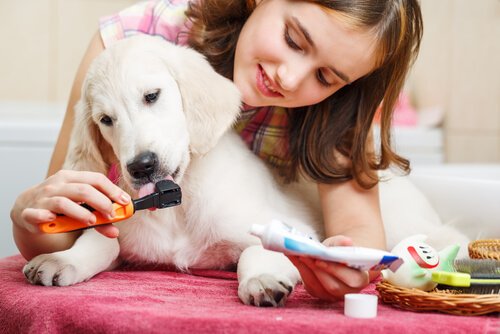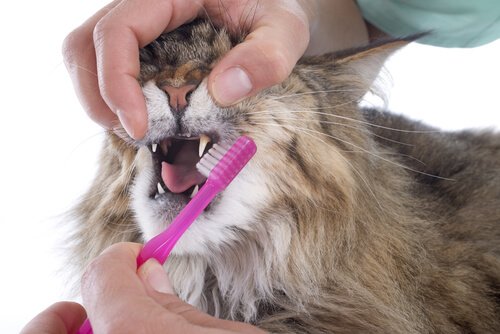How should I brush my pet's teeth?

Maintaining your dog’s oral health is an everyday responsibility, especially brushing his teeth is very important. Most owners choose to never do it, and this can result in serious complications.
Knowing how to brush your pet’s teeth is very important, and doing it correctly isn’t that hard. What can confuse owners is the large variety of brushes and toothpaste that are made for pets. So, in order to know what’s best for your pet, look at the tips provided here in this article.
Why should you brush your pet’s teeth?
One’s health begins in his/her mouth. The way your pet eats, and how well you take care of his mouth, will help prevent long-term diseases.
So, in general, taking care of your pet’s mouth is taking care of his body. So, how do you do it? This question is very common among first-time pet owners or people who feel questionable about this topic. The truth is that it’s actually quite simple and, in most cases, doesn’t require a lot of effort.
Poor brushing or total carelessness can cause the appearance of periodontal diseases in animals, which can be very painful. So, you should pay close attention to your pet and take good care of his oral health.
Veterinarians estimate that 85% of dogs over five years of age have periodontal disease. This is the result of food particles and bacteria that build up on the edge of the gums and form deposits called plaque.
The oral care of cats and dogs is similar; the differences are in the way you brush your teeth and the types of tools you use. Below you can find some information that briefly describes the technique you need to use according to the needs of each species.

Brushing your dog’s teeth
Neglecting your dog’s oral health can lead to serious diseases and even tooth loss. In some cases, they may experience intense pain caused by infection. But don’t worry, preventing these diseases is very easy and doesn’t take much time.
There are currently many products and different varieties of toothbrushes that may or may not make the job easier. The choice is up to you, but the outcome is the same no matter what.
- Start by getting your pet used to you having contact with his mouth. Otherwise, he may bite which will make your job more difficult and more tedious.
- Have him taste the toothpaste by putting a little bit on your finger. This will help him understand that it’s something tasty, and nothing that will hurt him.
- Start by gently brushing his fangs and front incisors. You should gradually move on to his molars, always making sure that you’re not being too rough on his gums so he won’t feel pain or start bleeding.
- Clean the remains with plenty of water.
Brushing your cat’s teeth
Cats are known for being very clean animals that don’t depend much on their human. This is mostly true, but not when it comes to their mouths, so brushing their teeth is still something you should do for them.

Bacterial plaque is very common in cats. When it builds up it causes bad breath and can damage your pet’s mouth. It can be yellow, or even black, which gives their teeth an awful appearance.
When it comes to dental care, pet stores sell brushes that fit your fingertips that are useful for greater precision and ease. It’s a good idea to start getting your cat used to getting his teeth cleaned at a young age to prevent him from biting and scratching you.
- Wrap your cat with a towel to keep him from scratching you. Apply some pressure with your forearms to stabilize him, but don’t overdo it.
- Clean his teeth with a gauze pad first. To this gently and slowly to keep him from squirming.
- Use the toothbrush starting at the front and moving towards the back. Don’t be rough. Use gentle and sometimes playful movements.
- Repeat this same process twice a week.
Brushing your pet’s teeth is a fairly simple task if you do it patiently and with love. If you want to help keep your pet’s mouth clean, you can also buy him treats that will contribute to his daily oral hygiene.
Maintaining your dog’s oral health is an everyday responsibility, especially brushing his teeth is very important. Most owners choose to never do it, and this can result in serious complications.
Knowing how to brush your pet’s teeth is very important, and doing it correctly isn’t that hard. What can confuse owners is the large variety of brushes and toothpaste that are made for pets. So, in order to know what’s best for your pet, look at the tips provided here in this article.
Why should you brush your pet’s teeth?
One’s health begins in his/her mouth. The way your pet eats, and how well you take care of his mouth, will help prevent long-term diseases.
So, in general, taking care of your pet’s mouth is taking care of his body. So, how do you do it? This question is very common among first-time pet owners or people who feel questionable about this topic. The truth is that it’s actually quite simple and, in most cases, doesn’t require a lot of effort.
Poor brushing or total carelessness can cause the appearance of periodontal diseases in animals, which can be very painful. So, you should pay close attention to your pet and take good care of his oral health.
Veterinarians estimate that 85% of dogs over five years of age have periodontal disease. This is the result of food particles and bacteria that build up on the edge of the gums and form deposits called plaque.
The oral care of cats and dogs is similar; the differences are in the way you brush your teeth and the types of tools you use. Below you can find some information that briefly describes the technique you need to use according to the needs of each species.

Brushing your dog’s teeth
Neglecting your dog’s oral health can lead to serious diseases and even tooth loss. In some cases, they may experience intense pain caused by infection. But don’t worry, preventing these diseases is very easy and doesn’t take much time.
There are currently many products and different varieties of toothbrushes that may or may not make the job easier. The choice is up to you, but the outcome is the same no matter what.
- Start by getting your pet used to you having contact with his mouth. Otherwise, he may bite which will make your job more difficult and more tedious.
- Have him taste the toothpaste by putting a little bit on your finger. This will help him understand that it’s something tasty, and nothing that will hurt him.
- Start by gently brushing his fangs and front incisors. You should gradually move on to his molars, always making sure that you’re not being too rough on his gums so he won’t feel pain or start bleeding.
- Clean the remains with plenty of water.
Brushing your cat’s teeth
Cats are known for being very clean animals that don’t depend much on their human. This is mostly true, but not when it comes to their mouths, so brushing their teeth is still something you should do for them.

Bacterial plaque is very common in cats. When it builds up it causes bad breath and can damage your pet’s mouth. It can be yellow, or even black, which gives their teeth an awful appearance.
When it comes to dental care, pet stores sell brushes that fit your fingertips that are useful for greater precision and ease. It’s a good idea to start getting your cat used to getting his teeth cleaned at a young age to prevent him from biting and scratching you.
- Wrap your cat with a towel to keep him from scratching you. Apply some pressure with your forearms to stabilize him, but don’t overdo it.
- Clean his teeth with a gauze pad first. To this gently and slowly to keep him from squirming.
- Use the toothbrush starting at the front and moving towards the back. Don’t be rough. Use gentle and sometimes playful movements.
- Repeat this same process twice a week.
Brushing your pet’s teeth is a fairly simple task if you do it patiently and with love. If you want to help keep your pet’s mouth clean, you can also buy him treats that will contribute to his daily oral hygiene.
This text is provided for informational purposes only and does not replace consultation with a professional. If in doubt, consult your specialist.








